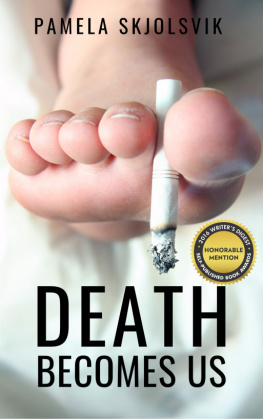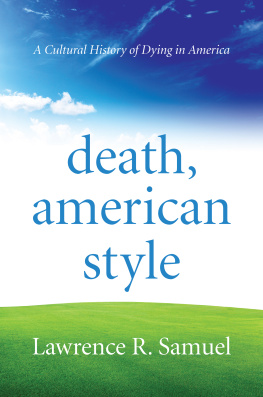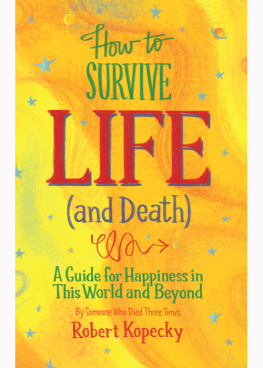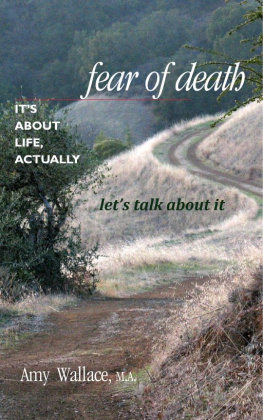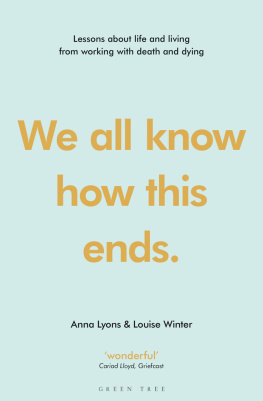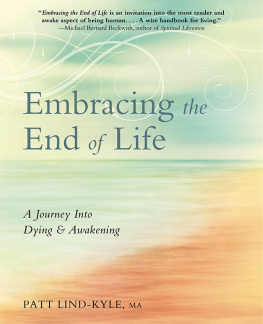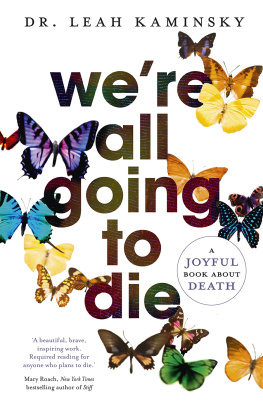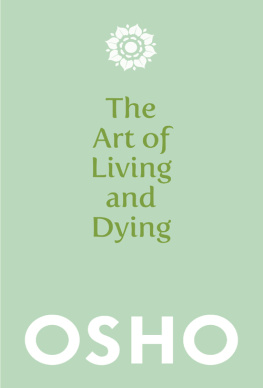DEATH BECOMES US
Pamela Skjolsvik
Copyright 2015 Pamela Skjolsvik
Smashwords Edition
All rights reserved. No part of this book maybe used or reproduced in any manner whatsoever including Internetusage, without written permission of the author.
Ebook formatting by Maureen Cutajar
www.gopublished.com
For Sonya Reed #878111
What do you say to a man who is beingexecuted tomorrow? Did you say good luck when you left? Im nottrying to mess with you. That must be a strange thing to sit downin front of somebody you know is going to die and youll ask melater what its like. Ill tell you what its like
Jim Willet, former Warden of the WallsUnit, Huntsville, TX
Contents
Authors Note
Due to HIPAA regulations, names and/oridentifying details have been changed to protect the identity ofsome people in this narrative. In certain other cases, if I havechanged the name of a person or a place, I make note of that changein the text. While most of my interviews were recorded, those doneat the prison were not, as I couldnt bring in a recorder or apencil and notebook.
Prologue
It would be pretty awesome to brag that Iconfronted death in a brave and dramatic fashion, but that would bea lie. I would never have embarked on an exploration of my biggestfear had it not been for David Foster Wallace. Its not that Mr.Wallace was my literary superhero or that his books inspired me toquestion the meaning of my existence. Honestly, I didnt know heexisted until September 12, 2008the day he died. I was nervouslywaiting for my grad school instructor to call so we could discussthe future of my MFA thesis. She had recently received my firstsubmission and I cringed at the thought of her slicing through mysentences with a red pen or cackling at my creative use of grammar.Not that she was a cackler, but she did intimidate me, and I wantednothing more than to impress her. Like Band-Aid removal, I figuredit was best to just get the whole uncomfortable conversation overwith as quickly as possible. Ten minutes past our scheduled meetingtime, I decided to take matters into my own sweaty hands. I foundher phone number in the MFA directory and dialed it.
A funeral home answered.
Oh, Im sorry. Wrong number, I said andpromptly hung up.
I dialed a second time without giving it muchthought. This time there was a hint of agitation in the womansvoice.
Its me again. Sorry, I apologized.
I felt like a pest for interrupting this poorwoman at her dismal job. I triple-checked my instructors numberand slowly pressed each digit with paranoid precision.
Funeral home.
I hung up without a word, scared that I hadentered the realm of prank calling and the phone authorities,whoever they were, would soon be pounding on my door. Perspirationtrickled down the inside of my shirt. My interactions withteachersor anyone in a position of authorityalways brought on thenerves. Anyone could tell by my resum or my laughable liberalstudies degree from an underachieving state college that I didntbelong in post-graduate work among professional journalists. I waspushing forty and working in a dead-end job that involvedproofreading ad copy for the phone book. And while I should havebeen grateful to be accepted into a writing program with suchesteemed company, I simply felt like a frauda two-bit campfirestoryteller with bits of marshmallow and melted chocolate stuck tomy aging face. While my classmates tackled big-issue topics likemurder, war and immigration, I played it safe and wrote about whatI knewmy quirky, neurotic self.
While I waited for her call, I refreshed myinbox, eyed the clock, and checked my phone every few minutes tomake sure there was still a dial tone. My two kids were upstairsglued to the television, but I knew that at the least opportunemoment theyd get bored or want to eat lunch and Mommys veryimportant college time would be over. I tried to rehearse theconversation Id be having with the teacher in my head so I couldspeed through it, but my thoughts kept returning to that funeralhome. What kind of person would want to work there? Having recentlybeen employed as a detention specialist in a jail, I thought Idhad a few strange jobs, but mortician made my former occupationlook pedestrian. People at funeral homes touched dead peopleandnot just quick little taps with their pointer finger. They hadprolonged contact with cold, decomposing bodies. What kind ofperson would subject themselves to that?
When the phone rang ten minutes later, itstartled me. Instead of playing it cool and answering on maybe thethird or fourth ring, I answered immediately without thepleasantries of Hello or Skjolsvik residence.
Do you live in a funeral home? When I triedcalling your house, I kept getting a funeral home.
From downstairs, I could hear that SpongeBob was over and two sets of footsteps were approaching thestairs.
Diana laughed as if this kind of thing wascompletely normal. For some reason, when Im on the phone andsomeone else calls, it gets diverted to this one particular funeralhome. I dont even know where theyre at.
My kids, Nik and Lola, stared at meexpectantly from the landing.
Hold on a minute. I covered the phone withmy hand. Mommys gonna be on the phone for about an hour and itsreally important that I talk to this nice lady. Please go backupstairs.
Can we have a snack? Lola moutheddramatically.
I nodded like a lunatic, knowing full wellthat both of my kids would use this phone call to theiradvantage.
Diana apologized for her lateness. Shed justfound out that David Foster Wallace had hung himself. She wasdevastated by the loss of one of her favorite writers. I wasconfused. Woo-woo as it sounded even to me, it felt like this callwas meant to happen the way it did. Death delayed her call, whilemine was diverted there by some strange cosmic hiccup of theland-line phone system. Despite the downer tone of ourconversation, Diana also felt that reaching that funeral home waskind of a happy accident. I had originally intended to write aboutall the weird jobs Id held, but since Id already been there anddone that, it didnt seem like much of an artistic leap. Death anddead bodies still lingered in my thoughts. Diana suggested that Iexplore professions that dealt with death. And because I admired mymentor and wanted to impress her almost as much as I coveted goldstars and future accolades, I contemplated tackling the most fearinducing assignment ever. But how could I admit to my brilliantmentor that not only was I afraid of death, I was also afraid ofpeople?
My heart pounded. This was a turning pointand I knew it. I could either play it safe like I always did or gobig and fail spectacularly.
Okay. That sounds like a good idea. Ill doit.
More than anything, I just wanted to end thecall so I could go outside and smoke. It didnt occur to me that Ihad just agreed to my death sentence.
Part One
Im not afraid of death; I just dont wantto be there when it happens.
Woody Allen
CHAPTER ONE
Meet a Stranger
The story begins, as all stories should,with a mysterious sticky note placed in the middle of my computerscreen. A name, a phone number and Funeral Guy is scribbled on itwith a Sharpie. I recognize the handwriting and shuffle into mycoworker Matts office with the yellow piece of paper adhered to mypointed finger.
George really wants to talk to you, Mattsays in his usual dramatic fashion, like it is absolutelyimperative that I call this morbid stranger immediately.
Is he weird?
I feel like Matt is trying to fix me up on ablind date with the elephant man. He mulls it over with his legssplayed in his high-dollar, super-fancy art director chair. I knowhes trying to fuel my neurotic fire and/or make me blush. I trynot to stare at his manspreading or the giant bulge that literallystretches to his knee. Assessing another persons weirdness isprobably not Matts forte.
Next page
